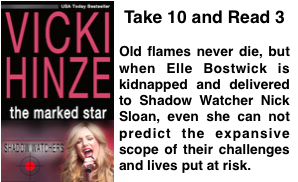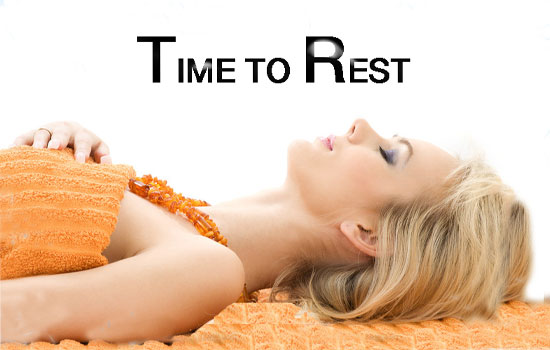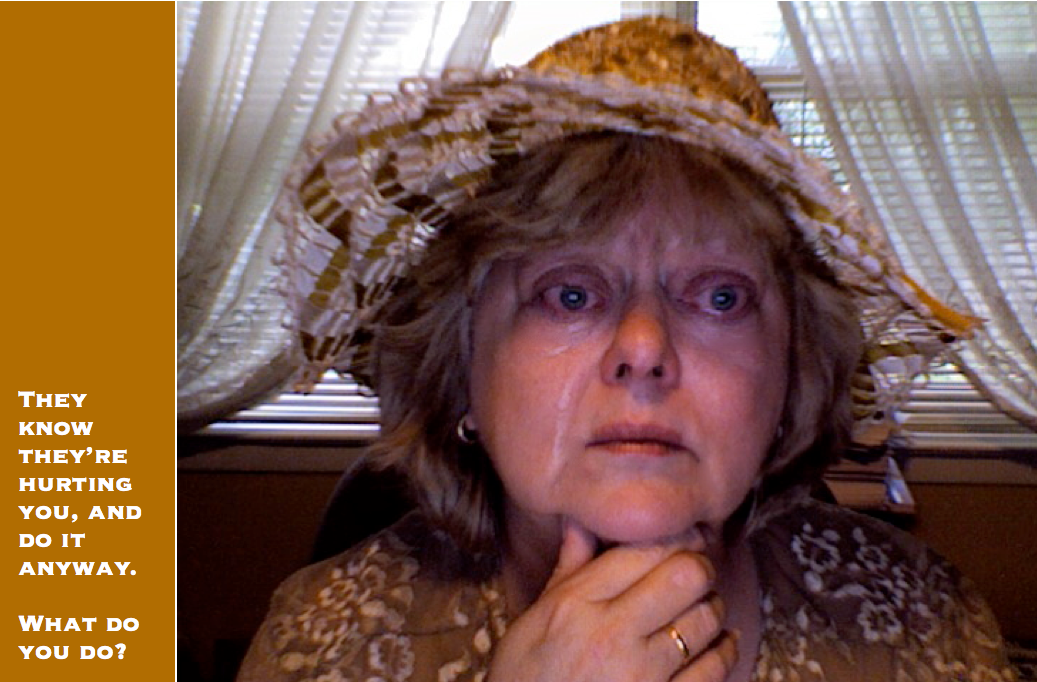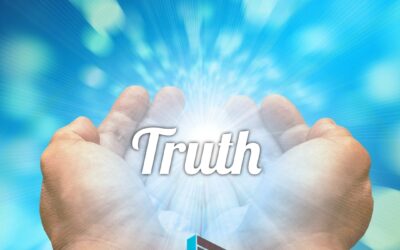TIME TO REST
By
Vicki Hinze
Today, we have technology assisting on fronts that were dreams for small business and sole proprietors even a short time ago—and we’re grateful for it. Expanded capabilities save us money and time on tasks that were out of reach, enable us to participate in areas that exceeded our ability and our budgets. Now, we’re able to incorporate them into our plans and benefit from them.
For most, these remain welcome changes even though they add additional work to our schedules—most of which are overloaded already. We were strapped for time. Now we’re living within the confines of the daily deluge.
Unfortunately, this is our reality, and when we add activities to our existing schedule… well, something has to give. First to go is often hobbies and things we enjoy doing but before long, we discover we’re culling everything not work related and things that aren’t beneficial to the goals we’re seeking to meet on that front.
The more capabilities we have and gain, the more we must do. Soon, we’re looking for more things we can cut from our schedule. We need more time to do what we’ve been doing and these new things. And unfortunately—usually sooner rather than later—we reach a point where we can’t cull anything else, so we cull rest.
We get up earlier, stay up later, and too often, we still need a little more time. We’ve already reduced lunch hours, made scheduled breaks “mini-task time,” and tied mental tasks to repetitive physical tasks. For example, some record articles or scenes in a book while commuting to and from work. Or while at the kids’ soccer or softball games.
While we deem these reduced rest times necessary, we need to rethink those decisions and seek alternatives. Why? Because when we do not rest, we lose efficiency, clarity, and our productivity actually drops. That means the quantity and quality of our work suffers.
That’s not a good thing regardless of the type of work we do, but it creates a plethora of serious challenges when our work requires creativity. Writing books, for example, is a creative pursuit. Writers create worlds and people and situations and events from nothing. That requires brain power. Keeping everyone and everything straight requires more brain power. Making people and events credible and logical requires even more brain power.
Brain power requires rest. It’s that simple.
So what can we do?
Some tips I find useful are:
- Delegate. If you can, delegate some tasks to an assistant. If you don’t have one, consider a virtual assistant or an intern. Consider recruiting a teen, someone retired, a parent who has spare time.
- Batch tasks. If you do a task repeatedly this comes in handy. For example. I do a weekly article for a Social In Global Network. On Monday morning, first of the month, I write all that month’s articles, do the graphics for them, upload and disburse them throughout the network. When you’re in the mindset of a task, you’re halfway done. So it’s easier to do the articles in a group than to do them weekly. Look at your schedule and batch similar tasks, then do them all at one time, while you’re in that mode. The discipline of having them batched and on your schedule makes the work more efficient also.
- Schedule your time and tasks. Not only will you learn to estimate the time needed to accomplish tasks, but you’ll stay out of routinely working in crisis-mode. That spares you from last-minute binges and impossible deadlines. Prioritize your schedule. Every day, take on your “Must Do” items first. That too lowers anxiety because the most important things are accomplished first. Too, your schedule more accurately reflects the uses of your time and how heavy your schedule is. Will it change? Yes, of course. Unforeseen situations and events always come up, but they come up either way. With high priority items done, you can weather the unforeseen situations and events with less disruption and chaos than if you haven’t worked by priority. When you include even the mundane in your schedule, you also see what you can and cannot add to your schedule without putting yourself in high-stress, anxious positions due to overloading your time.
- Make your sleep patterns habits. While you’ll have exceptions, set a routine for your days and especially your bedtime. If you typically go to bed at 10, your body clock is accustomed to it. Come nine, you’re body is already anticipating ten. Prepare for it. And give your bedtime priority.
When we sleep, we heal. We restore. We give our minds a chance to work. During the day, our subconscious mind records tons and tons of things that are going on around us. It slots all the information and input, then transfers to our conscious minds what it deems important. That claims our focus. When we short our minds of sleep, the subconscious must toggle between slotting and recording new stimuli. Our focus is divided, and we’re tired, so we don’t interpret as quickly or as clearly.
A few years ago, I came upon an article on sleep studies that said every hour you sleep before 2:00 am, is worth two hours of sleep after 2 am. It advocated going to bed earlier rather than later. I tried this to see whether or not my body responded to this in line with the study. It did—and the results surprised me. Going to bed at 10 pm, I slept the same number of hours as before, but on rising, I was sharper, my mind clearer, and I awakened more refreshed than when I went to bed at midnight. I slept 6 hours and felt better and sharper than when going to bed at midnight and sleeping two additional hours!
Study you and your sleep patterns to see if going to bed earlier—same time every night—helps you.
- Keep lunch for lunch and breaks as a few minutes to just be. Relaxing that ten minutes is healing and restoring, too. Your body needs this. Your mind needs this. And your emotions need this, too. Even a brief respite can work wonders for us and our attitudes. Sitting and breathing deep, taking a short walk. Sitting on a park bench. Whatever you do to free your mind, whatever helps you to feel serene, calms you, makes you smile is a good way to spend a short break.
One of the perks of taking those short breaks is you reap the calming benefits. Another is the attitude adjustments that come with the calm package. People are not machines. They cannot function at warp speed all the time. They don’t just want down time, they need it.
An example. If you’re in a highly tense event, you focus with intensity on the event. You don’t think about other things. The event absorbs all of your attention and your energy.
Now, imagine the impact on your body, mind and spirit of maintaining that intensity for an extended period of time and not just for a short spurt of time. Overload. And what happens when we overload? We shut down. Our emotions grow numb and we distance ourselves to protect us from overload. We are anxious and weary.
It’s impossible to be a creative genius when you’re numb and distant, anxious and weary.
Stress intensifies. Problems like headaches, muscle tensions, knots in the stomach and ulcers—and lots of other physical reactions that are harmful to your health—manifest.
Fewer crisis-mode postures equates to less time intense. A rested body can better cope with short bursts of intensity. Its reserve energy is intact. It isn’t facing the crisis while already functioning in crisis-mode or intense focus. You might be busy and invested, but you’re not hyper-alert and focused. So you can become hyper-alert and focus intensely short-term with less harm to the body. What happens to it chemically and hormonally, is you endure spikes but they’d be lower on a graph and not sustained. That means less numb time. Less time operating while on overload. Less anxiety and less weariness. That means, to your body, less harm, less health challenges manifest.
The point is: You don’t just want to be well-rested, your mind requires you be well-rested. Your body requires you be well-rested to function well. And both your mind being more at ease and your body being less stressed help keep your emotions in balance. That all makes for a more content, more settled and at ease you.
So when you’re contemplating what to cull, don’t make the mistake of cutting into your lunch time, breaks or sleep time. You need that time—to rest!
* * * * * * *
© 2016, Vicki Hinze.  Vicki Hinze is the award-winning bestselling author of nearly thirty novels in a variety of genres including, suspense, mystery, thriller, and romantic or faith-affirming thrillers. Her latest release is: The Marked Star. She holds a MFA in Creative Writing and a Ph.D. in Philosophy, Theocentric Business and Ethics. Hinze’s website: www.vickihinze.com. Facebook. Books. Twitter. Contact. KNOW IT FIRST! Subscribe to Vicki’s Monthly Newsletter!
Vicki Hinze is the award-winning bestselling author of nearly thirty novels in a variety of genres including, suspense, mystery, thriller, and romantic or faith-affirming thrillers. Her latest release is: The Marked Star. She holds a MFA in Creative Writing and a Ph.D. in Philosophy, Theocentric Business and Ethics. Hinze’s website: www.vickihinze.com. Facebook. Books. Twitter. Contact. KNOW IT FIRST! Subscribe to Vicki’s Monthly Newsletter!
* * * * * * *
RECOMMENDED THRILLER READ
Thriller
I’ve just read Steven James’ The Pawn and recommend it to readers who enjoy clever, complex stories with strong and vulnerable characters. No rough language, no gratuitous violence. Strong, compelling and realistic situations.
Suitable for Christian or General Market Readers.
Most interesting element: For me, it was the impact of childhood events on the adults people became. How it shaped their lives and they interpreted what happened and even more interestingly why those things happened.





